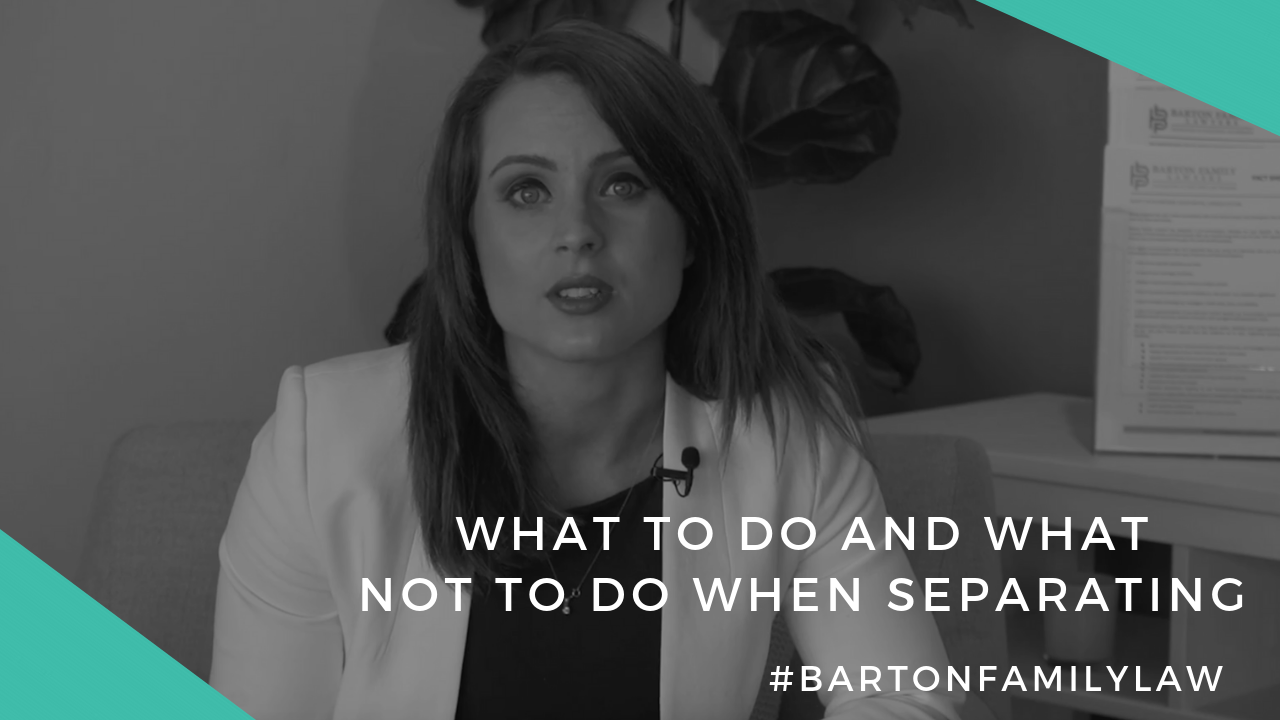The most important piece of advice we can give to parties going through a separation is to take a proactive approach, and don’t wait until things go wrong to seek family law advice.
The most common mistake we seeing made is that people wait for months or sometimes even years to obtain advice from an experienced Brisbane Family & Divorce Lawyer, and they usually only do so after a climactic event that has caused them some emotional or financial stress.
If you don’t sort out your asset division promptly after separation you may find that your ex starts selling or transferring assets without your consent. Once those assets are gone, you can rarely claw them back, particularly if the money has been spent or if the asset has been transferred to a bona fide (pure intention) third party purchaser.
We can’t count the number of times we have had clients come to us for urgent legal advice telling us that my ex is selling assets post separation but prior to a property settlement agreement being reached. Common statements are things like ” my ex has withdrawn $50,000 from the mortgage redraw facility” or “my ex has emptied $100,000 out of the joint accountant” or “my ex has our house on the market without their consent.”
In high conflict separations, it is common post separation for ex partners to dissipate assets, transfer them to family and friends or sell them privately in order remove those assets from the property pool available for division or hide them from the other party.
What if my ex has sold assets already?
Whilst it is not ideal, there are some options available to you if your ex has already sold assets without your consent.
Can I reverse the transaction?
Section 106B of the Family Law Act 1975 provides that the court can set aside a transaction that is made to defeat an existing or anticipated order in family law proceedings or which irrespective of intention, is likely to defeat any such order.
By way of an example, take a long relationship where the husband was the primary income earner and the wife is the primary carer for the two children. The parties have a house, an investment property and some super. After the parties separate, the Husband transfers the investment property into his sister’s name without knowledge or consent of the wife. In this type of situation, under section 106B, the court could order that the transfer of the home to the husband’s brother be set aside.
The section will not provide relief in every circumstance where a former spouse has disposed of assets, because the party seeking the relief must show that their entitlements have been ‘defeated’ and not just ‘reduced’ by the transaction. This can be difficult to prove.
The party seeking relief must also show that the purchaser is not ‘bona fide’. In other words, to reverse the transaction the purchaser must not have purchased the asset with ‘clean hands’, i.e. they had knowledge of the fact that the asset did not belong to the seller to sell to them in the first place.
Can the asset they sold be ‘added back’?
Before the High Court’s decision in Stanford (2012), if a party had deliberately or recklessly wasted property, or where there had been a premature distribution of property to one of the parties, that property could in most cases be ‘added back’ into the parties’ pool of assets and treated as a ‘notional asset’ for the purposes of property settlement.
For instance, if a party has taken $50,000 out of the joint account and gambled it at the pokies, that amount could be added into the property pool as an asset of the gambling spouse, such that they would receive less of the remaining assets available for division between the parties.
Post Stanford, the family law courts are extremely reluctant to add back ‘notional’ assets to the asset pool as the High Court said that in any application for the division of property, the Court should only consider the existing legal and equitable interests in property of the parties.
In more recent cases, it has become clear that notionally adding back property may still be possible but it is extremely rare and only in exceptional circumstances. It is therefore crucial that the right evidence is presented to the court to substantiate the add back.
Can I get more of the current pool?
Where courts don’t add back property, they can still consider the deliberate, reckless or negligent waste of property as a relevant factor under section 75(2)(o) of the Act.
This doesn’t mean getting a dollar for dollar adjustment to account for the property was wasted. Instead, the party’s conduct in wasting the assets is considered a relevant overarching factor in determining what orders are just and equitable in the circumstances.
What if my ex is selling assets but they are not sold yet?
Get an experienced Brisbane Family & Divorce Lawyer to write to the other party and put them on notice that they are not allowed to sell assets without your consent.
Alternatively, to preserve your entitlements, file an urgent application seeking an injunction to restrain the other party from dealing with assets which will have the effect of reducing your entitlements.
An injunction restricts a person from unilaterally disposing of or dealing with an asset, which would otherwise reduce the assets available for division in a property settlement.
A Court will grant an interim or ”interlocutory” injunction where there is a serious question to be tried and the ‘balance of convenience’ favours the applicant. The claim must not be frivolous and there must be a real risk that the applicant would suffer damage if the injunction is not granted.
Examples of financial injunctions include:
- restraining a party from dealing with real estate owned by the parties to the marriage or either of them (eg, attempting to sell the property or increase a mortgage secured on it);
- restraining a party from disposing of superannuation entitlements, shares or funds held in a bank or other investment account.
The Court has the power to make injunctions under Section 114(1) of the Family Law Act 1975 (Cth) (“the Act”). Where the Court makes an interlocutory injunction, the injunction must relate to the main proceedings (eg, property settlement / spousal maintenance), it must be just or convenient for the injunction to be made, and it can be made conditionally or unconditionally as the Court considers proper.
Where the injunction is granted three is usually a requirement that the applicant provide an undertaking as to damages. This involves the applicant undertaking to compensate the party whom the interlocutory injunction is made against, if that other party suffers any loss or damage as a result of the interim injunction.
Injunctions may be necessary to preserve assets at the start of a property case. They are made when the Court is satisfied that unless the injunction is made, there is a risk that any anticipated orders in favour of the applicant may be defeated or diminished.
In summary of the criteria that must be satisfied before a Court will grant an injunction:
-
- the applicant must have a basis for a claim under the Family Law Act (eg, property settlement or spousal maintenance);
- there must be objective evidence presented to establish a risk, threat or an intention to dispose of or dissipate assets, and;
- the terms of the injunction must be tailored to the circumstances and be no more than is necessary to protect the applicant.
In some cases where urgent injunctive relief is sought and there is a high level of risk to the applicant’s claim, the order may be made in the respondent’s absence without the usual procedural fairness that involves the application for the injunction being served and listed for hearing at short notice.
If the application is successful to have the injunction made in the absence of the respondent, the Applicant will be required to serve a copy of the order and all of their filed court documents on the other party and the matter will likely be adjourned for a short period to allow the Respondent to read and respond to the application and orders.
For more information on this topic, click the links to our articles on this topic:
- Injunctions to stop my ex selling assets.
- Hiding assets in a divorce : How do I uncover them?
- Protect your assets and family post separation.
What can I do to avoid my ex selling assets?
Attack prevention is a lot easier than damage control. In other words, it is ALOT easier for you to be proactive and take steps to preserve your assets and prevent asset dissipation, rather than to try to recover them after they have been disposed of.
In order to preserve your property settlement entitlements, we recommend that immediately after separation, you should:
- Put joint signatures on the mortgage and on all joint bank accounts;
- Keep an eye on the real estate market to make sure your ex isn’t selling property in their sole name;
- Put a caveat on any property in your ex-partner’s sole name to stop your ex selling it;
- Promptly engage an experienced Brisbane Family & Divorce lawyer to write to your ex putting them on notice that they can’t dispose of assets pending an agreement being reached;
- Commence urgent court proceedings and seek an injunction to restrain the other party from disposing of assets.
If the assets have already been disposed of your lawyer will advise you of the appropriate relief to seek, whether it be an order to set the transaction aside, a notional addback or an adjustment of the pool in your favour to account for the wastage by the other party. Alternatively, an injunction might be appropriate where the disposal of assets is imminent but preventable. The relief sought will depend upon the circumstances of each case and the above avenues are just some of the ways the court can deal with the dissipation of assets after separation.
Get Urgent Advice
Overall, if you think my ex is selling assets, the bottom line is to get urgent legal advice about what to do in your circumstances to minimise the losses suffered. By promptly engaging an experienced Brisbane Family & Divorce Lawyer we will provide you with invaluable advice about your specific circumstances so that you can avoid asset dissipation and preserve your property settlement entitlements.
If you are worried my ex is selling assets following separation, please do not hesitate to contact one of our experienced Brisbane Family & Divorce lawyers and book a reduced rate clean slate consultation to have a confidential discussion about your individual circumstances.
We can provide you with some invaluable advice to avoid a financial disaster in the first place.
For more information, check out our helpful Free Family Law Information Videos.



